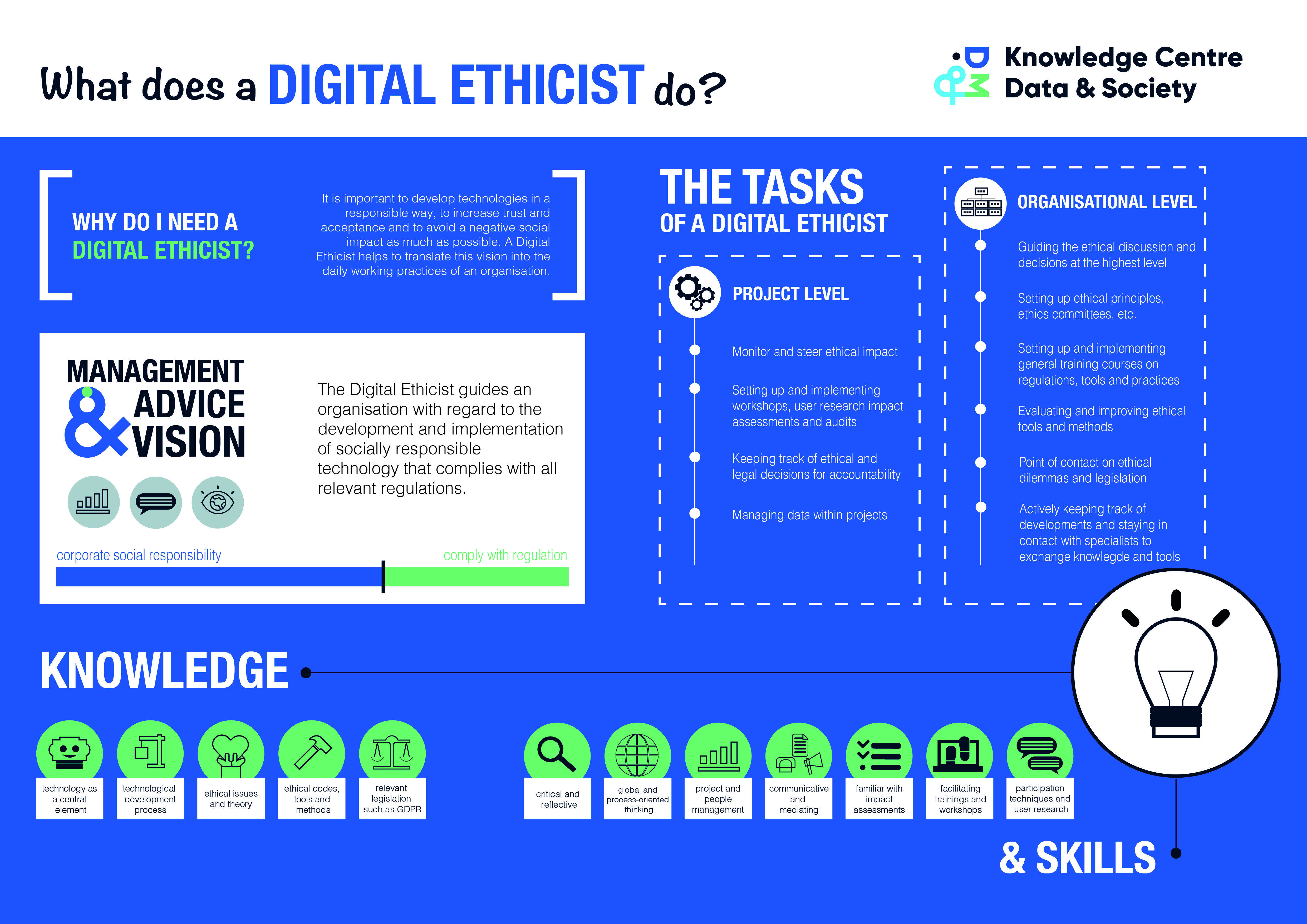What is a Digital Ethicist?
Because technology plays a major role in our daily lives, it is important to avoid a negative social impact of technology during development as much as possible. Yet, in practice, this is difficult, despite e.g. the different tool sets available to do so. In our report on 'Ethical principles and (non-)existing legal rules for AI' (only available in Dutch), we recommend the creation of a function that monitors the social, ethical and legal perspective of impactful technology. In this publication, we call such a person a digital ethicist. But what exactly does a digital ethicist do and what place can he or she have in your organisation? That is what this publication is about.
A digital ethicist (DE) can develop and maintain an ethical culture within the company and actively monitor a social perspective within innovation processes. The goal is to make ethics not an afterthought, but a central pillar within the organisation, whereby the impact of technology is considered throughout projects. The idea of an ethics officer in general, and for technological applications specifically, is on the rise and is seen as an important 'future job'. Yet there is little consensus on what that role looks like: what exactly is and is not included in the job description and how can someone take on that role in an organisation? Within this document, we try to give a general but specific description of (1) the function of a digital ethicist and (2) how this role is situated within an organisation.
- the role of a DE in an organisation;
- the greatest professional challenges for a DE;
- function profiles that are related to a DE, and where the common ground and differences lie;
- what a typical working week of a DE might look like.
(read the job description below the infographic)

Job description
A Digital Ethicist (DE) guides an organisation in the development and implementation of socially responsible technological innovation. This person has two main responsibilities:
Ensuring that applications comply with (inter)national regulations applicable to AI and (digital) technology.
Establishing, implementing and translating the company's ethical standards and values to the workplace for the development of (digital) technology with a positive impact on people, society and the world (corporate social responsibility).
A DE moves between all layers of the organisation to help decide the direction of the organisation and, within projects, to ground the social perspective in working practice. The DE can be a single person, but can also be a team of people who (partly) take on this role.
Task description
- A DE thinks along on a management level about the future direction of the organisation and which projects, ideas and initiatives can, or cannot, be carried out from a social perspective, or only if adjustments are made.
- A DE builds an ethical, responsible culture in all layers of the organisation by
setting up and further developing statements of principles, codes of ethics and ethics review boards within the organisation,
setting up general training on important regulations, tools, methods and ethical (product) development,
evaluating to what extent the methods and tools used by the DE add value to the process.
A DE is a point of contact for questions, problems and solutions regarding ethical dilemmas and legislation related to technological innovation.
A DE keeps close contact with legal specialists, ethicists, and similar roles in other companies and knowledge centres to share knowledge, tools and practices and translate this to the work floor.
In development projects, the DE is involved from start to finish to monitor and guide the ethical impact, using various techniques, such as workshops, brainstorming sessions, user research, impact assessments, auditing and testing of prototypes and data management.
A DE logs all decisions on ethical and legal aspects during the project, for justification afterwards.
Required knowledge and skills
A DE has knowledge of ...
the operation and ethical concerns of the technology that is central to the organisation;
the development process of technological innovations;
general ethical questions relating to technology, ethical theories and practices from engineering ethics, research ethics for human subjects, business ethics and/or professional ethics;
ethical codes and tools for use in the development process;
(basic) knowledge of GDPR and other relevant regulations.
General skills. A DE…
is critical and reflective, and can translate working points into pragmatic solutions;
can easily adopt a global metaperspective, and can think in process terms;
is good at project management and people management;
is communicative and able to bring stakeholders to consensus;
Is familiar with impact assessment techniques;
is familiar with organising and facilitating trainings and courses, workshops and brainstorm sessions;
is ideally also familiar with participatory (research) techniques and user research.
Do you want to know more?
Download the full publication for more information on how this role is situated within an organisation.
Because of the novelty of function profiles as a digital ethicist, we will continue to refine this publication. If you have any questions, input or feedback on how we can further refine this profile, please let us know.
